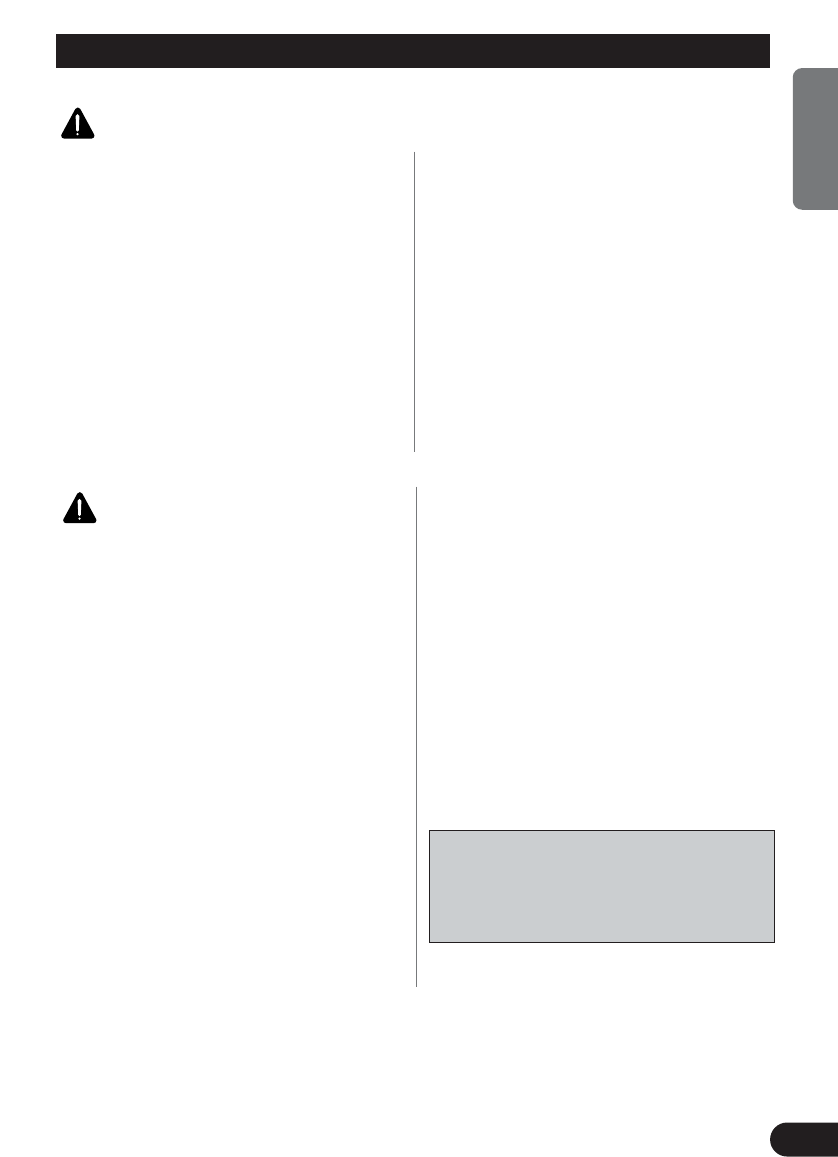
6
ENGLISH
ESPAÑOL
DEUTSCH
FRANÇAIS
ITALIANO
NEDERLANDS
êìëëäàâ
Connecting the Unit
CAUTION
To prevent damage and/or injury
• Do not ground the speaker wire directly or con-
nect a negative (–) lead wire for several speakers.
• This unit is for vehicles with a 12-volt battery and
negative grounding. Before installing it in a recre-
ational vehicle, truck or bus, check the battery
voltage.
• If the car stereo is kept on for a long time while
the engine is at rest or idling, the battery may go
dead. Turn the car stereo off when the engine is at
rest or idling.
• If the system remote control wire of the amplifier
is connected to the power terminal through the
ignition switch (12 V DC), the amplifier will
always be on when the ignition is on— regardless
of whether the car stereo is on or off. Because of
this, the battery could go dead if the engine is at
rest or idling.
• DO NOT connect a subwoofer with a lower
impedance than specified in the “Connecting the
Speaker Wires” section. Amplifier damage,
smoke, and overheating could result from a non-
specified connection. The amplifier surface could
also become hot to the touch and minor burns
could result.
• Connect either of three subwoofers to the amplifi-
er; 1: a subwoofer with a 500 W or larger nomi-
nal input and an impedance 4 Ω, 2: a subwoofer
with a 1 000 W or larger nominal input and an
impedance 2 Ω or 3: a subwoofer with a 1 200 W
or larger nominal input and an impedance 1 Ω. If
the nominal input and impedance are out of the
above ranges, the subwoofer may catch fire, emit
smoke or become damaged.
• Install and route the separately sold battery wire
as far away as possible from the speaker wires.
Install and route the separately sold battery wire,
ground wire, speaker wires and the amplifier as
far away as possible from the antenna, antenna
cable and tuner.
• Cords for this product and those for other prod-
ucts may be different colors even if they have the
same function. When connecting this product to
another product, refer to the supplied manuals of
both products and connect cords that have the
same function.
CAUTION
• Disconnect the negative (–) terminal of the bat-
tery to avoid the risk of short-circuit and damage
to the unit.
• Secure the wiring with cable clamps or adhesive
tape. To protect the wiring, wrap adhesive tape
around it where they lie against metal parts.
• Do not route wires where they will get hot, for
example where the heater will blow over them. If
the insulation heats up, it may become damaged,
resulting in a short-circuit through the vehicle
body.
• The amplifier increases the load on the battery
and charging system. Make sure that the vehicle’s
alternator and battery have sufficient capacity for
this amplifier. The use of a heavy-duty battery,
parallel connection of ordinary batteries or an
energy storage capacitor is recommended.
• Make sure that wires will not interfere with mov-
ing parts of the vehicle, such as the gearshift,
handbrake or seat sliding mechanism.
• Do not shorten any wires. Otherwise the protec-
tion circuit may fail to work when it should.
• Never feed power to other equipment by cutting
the insulation of the power supply wire to tap
from the wire. The current capacity of the wire
will be exceeded, causing overheating.
• Never replace the fuse with one of greater value
or rating than the original fuse. Use of an improp-
er fuse could result in overheating and smoke and
could cause damage to the product and injury
including burns.


















